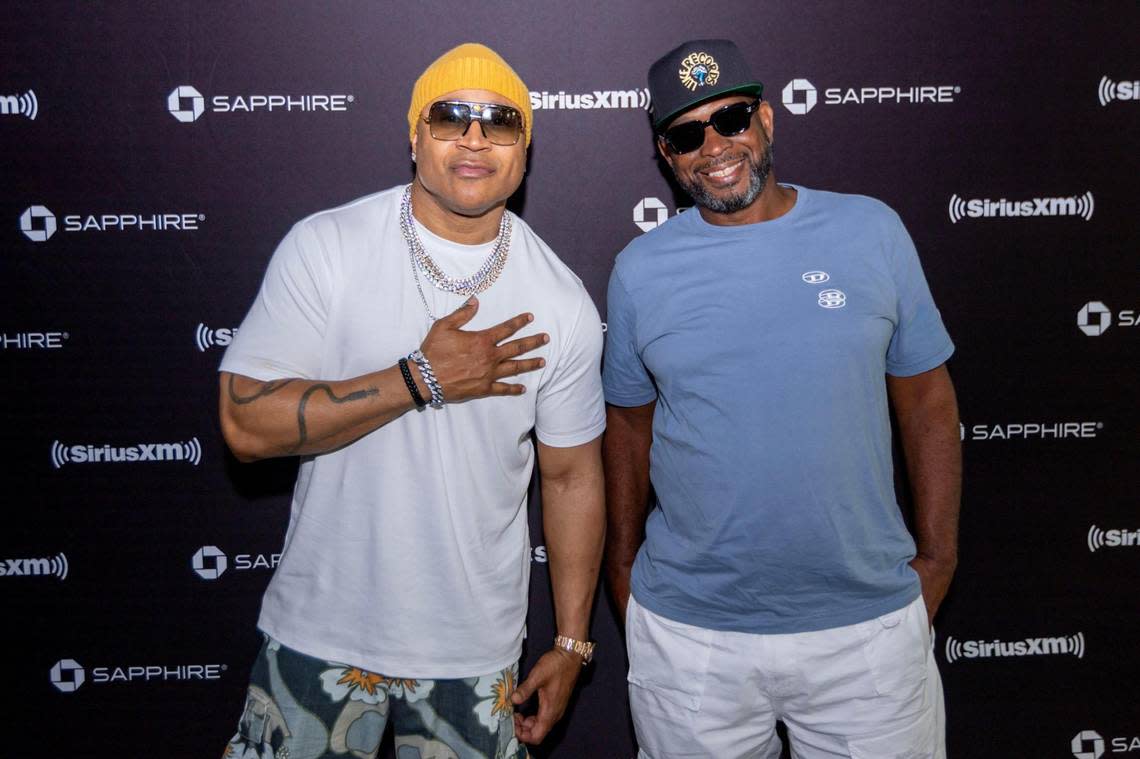LL Cool J just paid homage to Uncle Luke and Miami’s underrated hip-hop history

- Oops!Something went wrong.Please try again later.
- Oops!Something went wrong.Please try again later.
- Oops!Something went wrong.Please try again later.
Miami hip-hop might not exist without Uncle Luke.
2 Live Crew were Miami’s first act to break into the mainstream after all. But even before that, he was the concert promoter that brought the biggest hip-hop acts to Miami during the 80s.
“I know the culture unlike anybody else from Miami because, at that time, it was virtually no hip-hop,” said Luther Campbell, better known as Uncle Luke. “I brought all the hip-hop artists down.”
The legacy of Miami hip-hop was honored Friday night at the live taping of LL Cool J’s “Salute the Sample” show on Rock the Bells radio. Filmed at the recently opened SiriusXM studio in South Beach, the show paid homage to the Magic City’s robust yet underrated hip-hop history as the two-time Grammy Award winner broke down samples with DJ Khaled, Uncle Luke and Trina.
“Miami brought a lot of fly vibes, a lot of hustler vibes to the scene — a different type of glamour,” LL Cool J told the Miami Herald prior to the show’s taping.” “Look, even the movie ‘Scarface’ being filmed down here and what that meant to hip-hop; Miami was obviously a main character in that movie.”
Born James Todd Smith, LL Cool J has been coming down to Miami since the mid-1980s. At that time, he recalled, Miami’s hip-hop scene was virtually nonexistent. That changed with 2 Live Crew, according to Smith who said the group made some of the “nastiest” records ever.
“We’re in Miami, it’s all sexy and half the people don’t got no clothes on, there’s nakedness everywhere — this is what we are,” Campbell said. “We can’t be New York. New York is New York. L.A. is L.A. We got to be totally different”
It wasn’t always easy. A federal judge ruled “As Nasty As They Wanna Be,” 2 Live Crew’s 1989 project, legally obscene. A performance once landed group members in jail. It wasn’t until 1992 that the judge’s ruling was overturned, a huge win that transformed Campbell into a First Amendment warrior.
“What this does is let Black folks know that the First Amendment really does apply to us,” Campbell told the Los Angeles Times in 1992. “It says we can speak our minds the same way that white people do. This isn’t just a victory for 2 Live Crew. The entire music industry won big on this one.”
Campbell’s success eventually opened doors for future acts like DJ Khaled and Trina, both of whom have cemented themselves as stars in their own right.
“Miami is just a great place for music,” Smith said. “It’s a real creative city.”
In breaking down the tracks, however, a rather rich and diverse musical pallet is revealed. Songs like “Layla” by Derek and the Dominoes, “The Man-Machine” by Kraftwerk and “Boogie Shoes” by KC and the Sunshine Band inspired some of the best music to come out of Miami in the last 40 years.
“That’s what’s so dope about sampling.” said Khaled Mohamed Khaled, otherwise known as DJ Khaled. “You don’t have to overproduce.”
It’s not always an easy process to get these songs cleared, though. Khaled, for example, revealed that it took a personal call to Eric Clapton and roughly three weeks to get the famed guitarist to clear “Layla.”
“This was hard to clear,” Khaled said, adding that when the person who controls the song’s publishing initially told him he couldn’t use the track.
What’s abundantly clear from the artists, however, is the sample allows older music to inspire a new generation of fans. Take “Paradise” by Trick Daddy and Trina for example, an upbeat, lighthearted track that finds the Miami legends waxing about the beauty of the 305. That song samples Meli’sa Morgan’s “Fool’s Paradise,” a 1986 track that takes Trina back to her childhood.
“This is just like Miami,” said Trina. “This is on the beach, it’s in the house, it’s at the cookout, at the barbecue — like any type of family function.”
And whether the source material is rock, dancehall or funk, it’s amazing how these songs have been transformed to shape Miami’s hip-hop scene.

